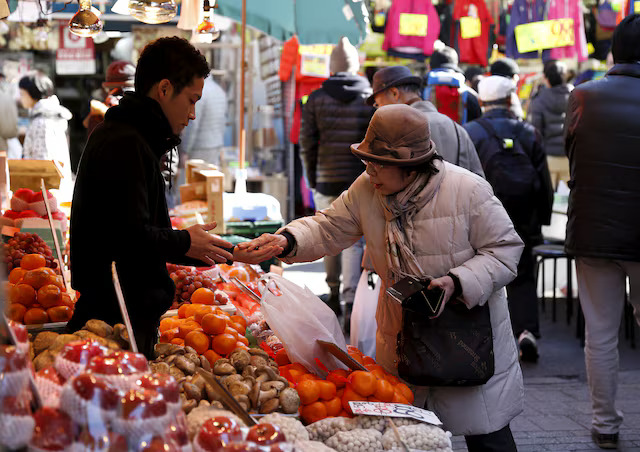TOKYO -- Japanese household spending fell at a slower pace than expected in November, government data showed on Friday, but the broader consumption trend remained soft, weighed by higher prices.
While strong wage hikes are expected in pay negotiations this spring, analysts say inflation could squeeze the recovery in real wages and personal consumption, casting uncertainty over the Bank of Japan's rate hike plans.
Consumer spending dropped 0.4 percent in November year-on-year, data from the internal affairs ministry showed, slightly better than the median market forecast for a 0.6-percent decline. On a seasonally adjusted, month-on-month basis, however, spending increased 0.4 percent, versus an expected 0.9-percent fall.
"The negative margin is shrinking, but consumption is at a standstill," said an internal affairs ministry official, adding belt-tightening consumers are opting for cheaper alternatives such as chicken instead of beef.
Consumers cut spending on food, clothing and entertainment, while expenditure in education and housing went up, the data showed.
The warmer weather also held consumers back from purchasing seasonal apparel and air conditioners, the official said.
"This year's pay negotiations are believed to result in a certain degree of wage increases, but the soaring prices of food and the depreciation of the yen have meant that other items have also remained higher than initially expected," said Masato Koike, senior economist at Sompo Institute Plus.
Consumption and wage trends are among key factors the Bank of Japan (BOJ) is watching to gauge economic strength and decide how soon to raise interest rates.
November's pay data released on Thursday showed inflation-adjusted wages slid for the fourth straight month in November, dragged by higher prices even though base pay grew at the fastest pace in three decades.
"It's difficult to imagine a scenario where real wages and personal consumption will grow," Koike said, adding there were few factors backing a BOJ rate hike at the January 23-24 policy meeting.
The BOJ ended massive monetary stimulus and raised interest rates to 0.25 percent last year. While some investors are betting the next rate hike will take place this month, others see a stronger chance in March.




















































